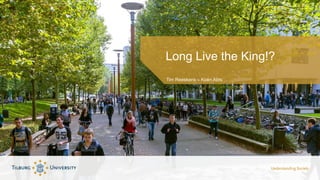Long Live the King
- 1. Tim Reeskens – Koen Abts Long Live the King!?
- 2. 208-06-2017Dag van de Sociologie 2017 Who is Who?
- 3. 308-06-2017Dag van de Sociologie 2017 • Royal families remain surprisingly popular • Albeit in a rather ceremonial role • Important institute in Comparative Politics • Monarchy as power-sharing institution • Monarchy as a binding institute • Not brought down at the individual level How are support for the monarchy and social trust related to each other? The (Alleged) Power of the King
- 4. 408-06-2017Dag van de Sociologie 2017 • Robert Putnam (1993): Making Democracy Work • And its critics of the Institution-Centered Approach • Institutions are able to craft or destroy trust • Cross-national and longitudinal evidence • Parliamentary monarchy often neglected • Not by Christian Bjørnskov (2007): • Social and political stability • Common national conscience • Trust allows the monarchy to be sustained Back to the Start
- 5. 508-06-2017Dag van de Sociologie 2017 • Perceptions of institutional quality foster social trust (Sønderskov & Dinesen, 2016) • Parliamentary monarchies craft social trust  Positive opinions about monarchy are positively related to social trust So, the Puzzle
- 6. 608-06-2017Dag van de Sociologie 2017 • Divided by the imaginary language border • Flanders and Wallonia growing socially and culturally apart • The role of the monarchy is explicitly articulated “[A]n over-arching Belgian political and economic elite still exists, which uses its not inconsiderable, albeit significantly reduced power to maintain the unity of the country. The still-popular monarchy plays a key role in this respect.” (Billiet, Maddens & Fognier, 2006, p. 930) Belgium as an Ideal Test Case
- 7. 708-06-2017Dag van de Sociologie 2017 • Fielded every federal election • Representative for Belgium • Analyzing the 2014 wave • N = 1,822 • Flanders: 1,136 (62.4 percent) • Wallonia: 686 (37.6 percent) Belgian National Election Study
- 8. 808-06-2017Dag van de Sociologie 2017 • “Presently, you cannot be sure who or what you can trust” • “You cannot be too careful in dealing with other people” • 1-5, higher values indicate more trust Dependent Variable: Social Trust
- 9. 908-06-2017Dag van de Sociologie 2017 Variable Factor 1 Factor 2 The King should say more in politics 0.286 0.838 The King is important to the international prestige of our country 0.774 0.193 In a modern democracy like ours, the monarchy is out of date -0.593 -0.205 In his speeches, the King should be able to say what he wants 0.085 0.380 We should be glad that we have a King, because otherwise Belgium would fall apart 0.659 0.254 The King may not have any political role -0.237 -0.520 Independent Variable: Support for the Monarchy Cronbach’s alpha: 0.75
- 10. 1008-06-2017Dag van de Sociologie 2017 Model 1 Model 2 Model 3 Intercept 2.62*** 1.65*** 0.89*** Flanders dummy 0.34*** 0.31*** 0.20*** Attitudes towards monarchy -0.11*** -0.05* -0.10*** + Structural control variables X X + Ideational control variables X R2 5.31% 24.31% 30.46% Analysis on Pooled Data * p < 0.05; ** p < 0.01; *** p < 0.001
- 11. 1108-06-2017Dag van de Sociologie 2017 Flanders Wallonia Pooled Intercept 0.93*** 1.02*** 0.82*** Flanders dummy 0.32* Attitudes towards monarchy -0.10** -0.06 -0.06 Interaction -0.04 + Structural control variables X X X + Ideational control variables X X X R2 27.83% 28.24% 30.49% Sub-National Analysis * p < 0.05; ** p < 0.01; *** p < 0.001
- 12. 1208-06-2017Dag van de Sociologie 2017 • Great idea (at the country level) • However, reality at the individual level strikes back • Monarchy (in Belgium) more polarizing then uniting? • Link between satisfaction with democracy and support for monarchy • The former is positively related to trust • The latter negatively • Difference between King as institute and as role (?) To Conclude
- 13. 1308-06-2017Dag van de Sociologie 2017 t.reeskens@uvt.nl Thank you!






![608-06-2017Dag van de Sociologie 2017
• Divided by the imaginary language border
• Flanders and Wallonia growing socially and culturally apart
• The role of the monarchy is explicitly articulated
“[A]n over-arching Belgian political and economic elite still exists,
which uses its not inconsiderable, albeit significantly reduced
power to maintain the unity of the country. The still-popular
monarchy plays a key role in this respect.”
(Billiet, Maddens & Fognier, 2006, p. 930)
Belgium as an Ideal Test Case](https://image.slidesharecdn.com/dvdsreeskens-170607213617/85/Long-Live-the-King-6-320.jpg)






